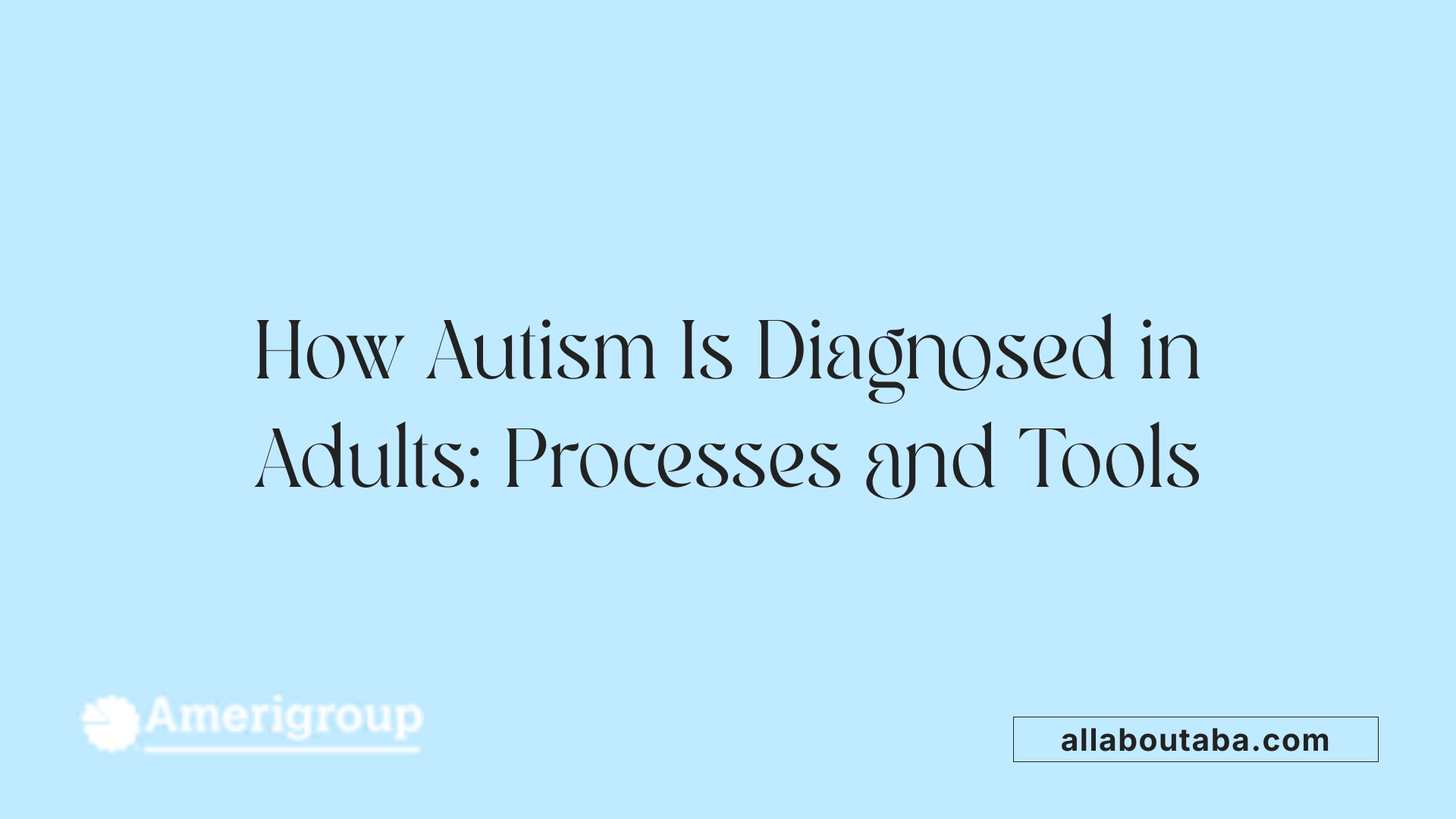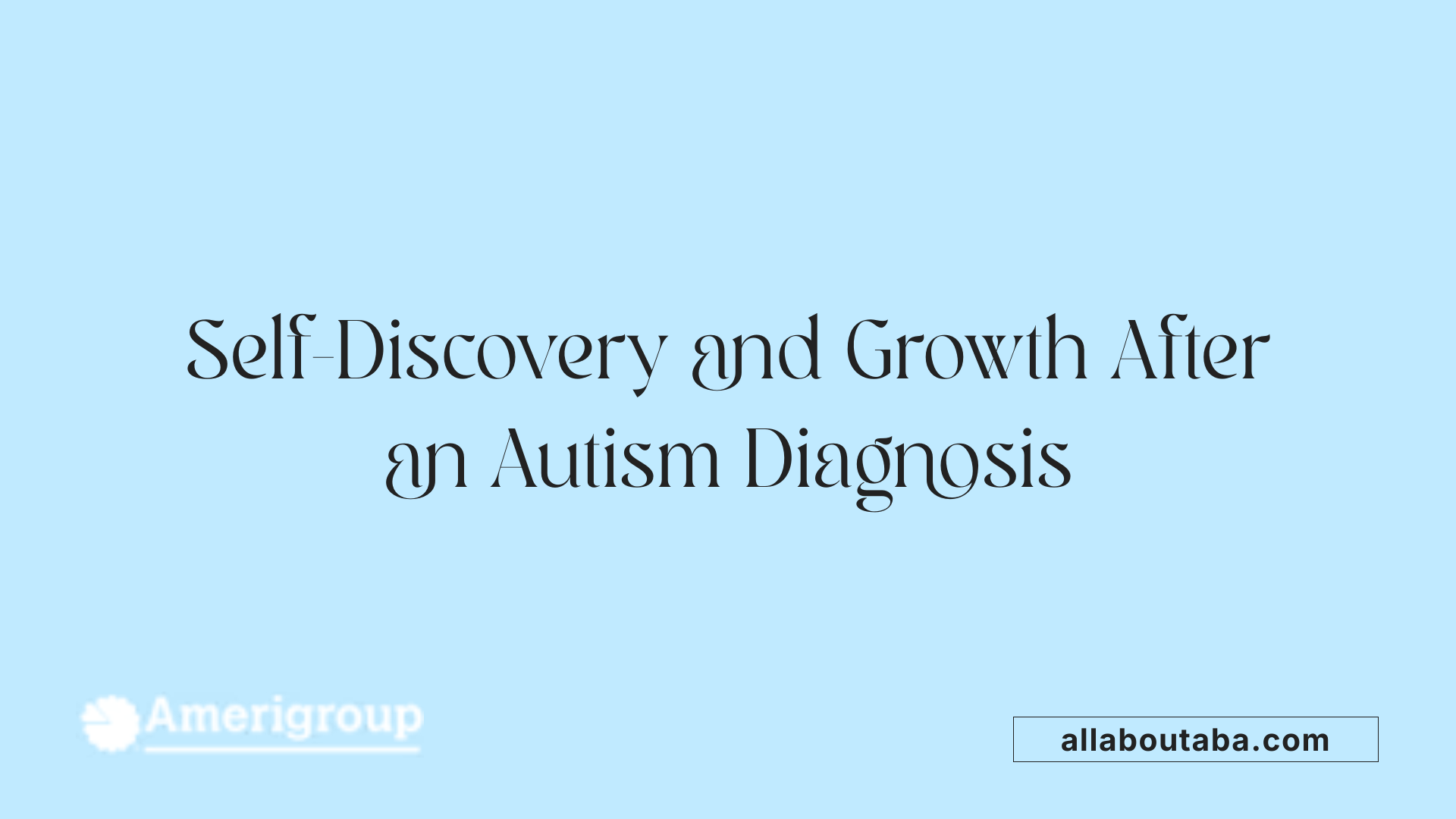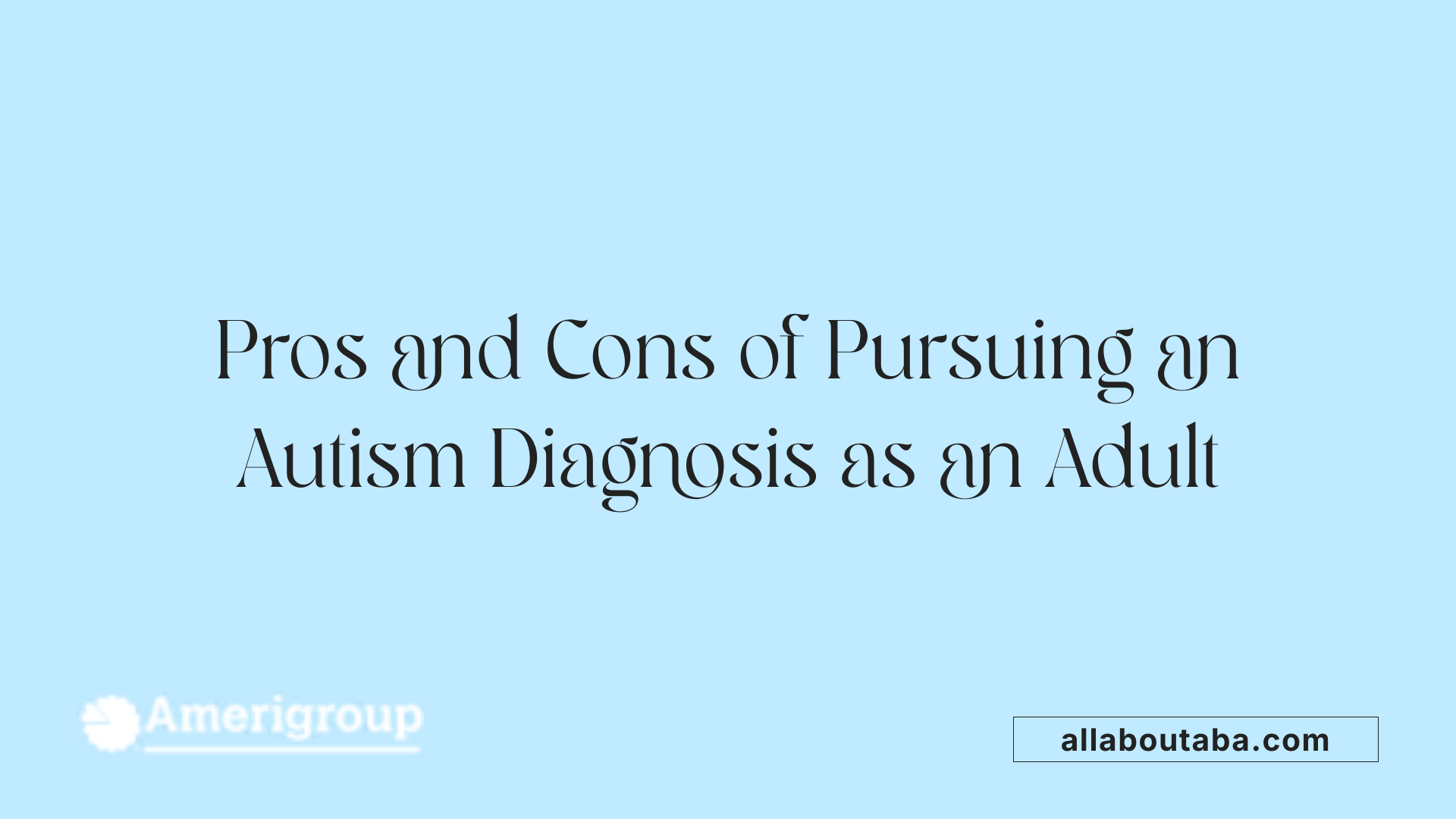Deciding Whether an Autism Diagnosis Is Right for You or a Loved One
Many adults wonder if seeking an autism assessment is worthwhile. With increased awareness and available resources, understanding the potential benefits and challenges of getting diagnosed later in life is crucial. This article explores what an autism diagnosis entails for adults, how it can transform understanding and support, and what factors aim at helping individuals decide if pursuing a diagnosis aligns with their personal needs and goals.
Recognizing Autism in Adults: Symptoms and Assessment Procedures

What are common symptoms and assessment procedures for diagnosing autism in adults?
Many adults with autism experience challenges in social communication. They may find it difficult to start or maintain conversations, interpret social cues like body language and facial expressions, and form or sustain relationships. Restricted interests and repetitive behaviors—such as an intense focus on specific hobbies or routines—are also prevalent. Sensory sensitivities, like being overwhelmed by loud noises or bright lights, and a strong preference for routines often mark adult autism symptoms.
Adults may also struggle with understanding or expressing feelings, adapting to change, or coping with unexpected events. Because many develop coping mechanisms, such as masking their symptoms, recognition can be complicated.
Diagnosing autism involves a detailed process led by specialists including psychologists, psychiatrists, or neuropsychologists. The assessment usually includes structured interviews, behavioral observations, and standardized tools like the Autism Diagnostic Observation Schedule (ADOS-2). It also involves collecting a thorough developmental history, sometimes with input from family members, to understand childhood behaviors and current functioning.
These evaluations seek evidence of persistent social and behavioral difficulties that interfere with daily life, relationships, or work. This comprehensive approach ensures accurate diagnosis, which in turn opens doors to tailored support systems, therapies, and a better understanding of oneself. Although the process can be complex and sometimes challenging—due to recall issues or masking behaviors—getting assessed is an essential step toward personal clarity and improved quality of life.
The Personal and Emotional Implications of an Autism Diagnosis

What personal implications does an autism diagnosis have?
An autism diagnosis can profoundly influence how adults see themselves. It provides a clearer understanding of their strengths, such as unique skills, intense interests, or attention to detail, and sheds light on challenges they might face, like social communication difficulties or sensory sensitivities. This insight often helps individuals make sense of past experiences and behaviors, fostering a stronger sense of self-awareness.
Emotionally, receiving this news can evoke a broad spectrum of reactions. Some may feel relief, validation, or newfound pride, especially if they have long suspected they were autistic. Others might experience feelings of grief or loss, mourning the missed opportunities for early support or feeling overwhelmed by the diagnosis.
Importantly, over time, many adults find that a diagnosis leads to greater self-acceptance. Understanding their neurodiverse identity can boost confidence and reduce feelings of shame or inadequacy.
A formal diagnosis also opens doors for accessing targeted support, educational adjustments, and legal protections, which can improve daily life and contribute to long-term planning. Overall, a diagnosis is often a turning point—empowering individuals to embrace who they are, advocate for themselves, and navigate their world with increased understanding.
Is It Worth Knowing? Weighing the Benefits and Drawbacks of Diagnosis

Is it worth finding out if I am autistic?
Deciding whether to pursue an autism diagnosis as an adult is a personal choice that can be influenced by various factors. For many, receiving a formal diagnosis offers a significant sense of validation and relief. It helps individuals better understand their own behaviors, feelings, and social interactions, often reducing feelings of shame or inadequacy.
A diagnosis can also serve as a crucial gateway to accessing targeted support and services. This includes therapies like social skills training, occupational or speech therapy, and educational accommodations such as IEPs or 504 plans for college students. It can also enable adults to obtain protections under laws like the Americans with Disabilities Act (ADA), which can help secure reasonable workplace accommodations.
In addition, understanding one's diagnosis may facilitate mental health support for conditions commonly associated with autism, such as anxiety or depression. It can help clarify personal challenges, foster self-acceptance, and guide individuals toward communities where they can find understanding and support.
However, some adults may worry about the emotional impact or potential stigma associated with diagnosis. Concerns about labeling, discrimination, or negative perceptions can influence the decision. Despite these worries, many find that with proper resources and community support, the benefits of clarity, validation, and access to tailored services outweigh the drawbacks.
Ultimately, whether pursuing a diagnosis is worthwhile depends on your needs, feelings about self-understanding, and your goals for support and personal growth. The process can empower you with knowledge, connect you with resources, and help you build a richer understanding of yourself within a supportive community.
How a Diagnosis Can Improve Access to Resources and Support
How can an autism diagnosis impact access to support and resources?
Receiving a formal autism diagnosis can open doors to many essential resources that improve quality of life. It allows individuals to qualify for specialized therapies, such as speech, occupational, and behavioral interventions, which are tailored to meet their specific needs. These therapies can help with communication, self-regulation, and social skills, fostering greater independence.
An official diagnosis also makes it easier to access educational support, like accommodations in school or college, such as 504 plans or Individualized Education Programs (IEPs). These adjustments help students manage learning differently and succeed academically.
Legal protections under laws like the Americans with Disabilities Act (ADA) can also be activated when a person is diagnosed. This includes workplace accommodations such as flexible schedules or quiet workspaces, aiming to create supportive employment environments.
In addition, an autism diagnosis can facilitate access to financial assistance programs and community services, including mental health support and social groups. It can also reduce feelings of stigma, increase self-awareness, and promote self-advocacy.
Early diagnosis is especially valuable for children, as it can lead to early intervention, which is associated with improved developmental outcomes. For adults, a diagnosis provides validation, helps explain past experiences, and makes life’s challenges more manageable.
Overall, a clear diagnosis helps individuals navigate systems more effectively, ensuring they receive the support they need to thrive socially, educationally, and professionally.
| Support Area | Resources Available | Additional Details |
|---|---|---|
| Therapy & Treatment | Speech, occupational, behavioral therapies | Tailored interventions based on individual needs |
| Education Support | 504 plans, IEPs | Adjustments in school environments |
| Legal & Workplace Protections | Reasonable accommodations | Laws like the ADA and IDEA ensure rights |
| Financial & Social Support | Grants, benefits, community programs | Helps cover therapy costs and social engagement |
| Community & Self-awareness | Support groups, advocacy organizations | Promote self-acceptance and peer support |
Gaining a formal autism diagnosis can be a vital step toward accessing a comprehensive support network, promoting personal growth, independence, and community participation.
The Path to Diagnosis: What You Need to Know
What is the process involved in getting diagnosed with autism as an adult?
Getting an autism diagnosis as an adult typically begins with consulting a qualified healthcare professional, such as a psychologist, psychiatrist, or neuropsychologist who is experienced in assessing autism spectrum disorder (ASD). The process involves several steps to ensure a thorough evaluation.
First, you'll usually have an initial appointment where the clinician discusses your behaviors, challenges, and concerns. They may ask about your developmental history, which can sometimes be difficult to recall but is important for diagnosis. To gather a complete picture, the clinician might speak with family members or close friends who have observed your behaviors over time.
Next, the assessment often includes standardized tools like the Autism Diagnostic Observation Schedule (ADOS), a structured observational test that evaluates social interaction, communication, and behaviors associated with autism. Questionnaires, such as the Autism Spectrum Quotient (AQ), can also be used to explore traits that are common in autistic individuals.
The diagnosis is based on DSM-5 criteria, considering whether symptoms have been present since early childhood and if they cause significant impairment in daily life. Because there are no medical tests to diagnose autism, the evaluation relies heavily on behavioral insights and history.
Completing this comprehensive assessment can be a pivotal step towards accessing tailored support services, legal protections, and gaining a clearer understanding of oneself. This process underscores the importance of working with professionals who are experts in adult ASD diagnosis, ensuring an accurate and helpful result.
Challenges and Considerations When Pursuing an Adult Autism Diagnosis
What are the challenges and considerations when pursuing an autism diagnosis later in life?
Pursuing an autism diagnosis as an adult can be a complex journey, with several obstacles along the way. One of the main barriers is the limited availability of specialists trained to diagnose adults with autism, which can lead to long wait times and difficulty finding qualified professionals. The costs associated with assessment are also significant, often ranging from $2,000 to $6,000, making affordability a concern for many individuals.
In addition, the process of diagnosis typically involves comprehensive assessments, including detailed personal histories, observations, and standardized tests such as the Autism Diagnostic Observation Schedule (ADOS-2). This can be both emotionally demanding and time-consuming.
Many adults face societal misconceptions about autism, leading to feelings of disbelief or resistance to accepting a diagnosis. For others, stigma or fear of labeling may hinder seeking evaluation or disclosure.
Furthermore, there are notable disparities in diagnosis, particularly among women, older adults, and minority groups. These populations often experience underrecognition due to outdated diagnostic criteria or masking behaviors, which are more common in some individuals and can obscure signs of autism.
Despite these challenges, obtaining a formal diagnosis can be highly beneficial. It can lead to increased self-understanding, access to tailored therapies, legal protections like reasonable workplace accommodations, and appropriate support services. Recognizing the barriers and navigating the diagnostic process require persistence but can ultimately improve quality of life by fostering personal growth, self-acceptance, and community connection.
Conclusion: Is the Diagnosis Worth It?
What are the benefits of getting a late autism diagnosis?
Receiving an autism diagnosis later in life can offer many advantages. One of the biggest benefits is a deeper understanding of oneself. Many adults who seek diagnosis do so because they recognize traits or experiences that match autism, and a formal diagnosis can provide clarity and validation.
A late diagnosis helps individuals reframe past challenges—such as mental health issues, difficulty in social situations, or feelings of being 'different.' With this understanding, they can develop targeted strategies to manage their daily lives more effectively.
Access to support services is another significant benefit. A diagnosis often opens doors to specialized therapies, social programs, and workplace accommodations. Many third sector organizations require proof of autism for access to mental health support and community resources.
Recognition also improves relationships with family, friends, and employers. Knowing autism is part of one's identity can foster better communication and understanding, reducing feelings of shame or inadequacy.
Furthermore, a formal diagnosis legitimizes experiences that might have previously been misunderstood or dismissed, providing a sense of validation. This can boost self-esteem and promote pride in one's neurodiverse identity.
Ultimately, whether a late diagnosis is worthwhile depends on personal circumstances and goals. For many, it is a pivotal step toward self-awareness, acceptance, and improved quality of life.
Is this a personal decision?
Deciding to pursue an autism assessment as an adult is highly individual. Factors such as the desire for better self-understanding, access to support, or clarifying past experiences influence this decision. It’s essential to consider personal readiness and the potential emotional impact.
Consulting healthcare professionals, therapists, or support groups can help weigh the benefits and challenges associated with diagnosis. While some may worry about stigma or labeling, many find that the positive outcomes—like empowerment and community connection—far outweigh these concerns.
What is the long-term impact?
A formal diagnosis can have lasting effects. It often leads to improved self-awareness, which can ease mental health struggles and foster resilience. It also facilitates long-term planning, including support in education, career, and independent living.
Knowing one is autistic can empower individuals to advocate for their needs and access accommodations both in the workplace and educational settings. It can also promote participation in support groups and community activities, which contribute to a sense of belonging.
In sum, a late autism diagnosis can significantly influence a person’s life, offering clarity, support, and community. While the decision should be personal, many adults find it a worthwhile journey toward fuller self-understanding and acceptance.
Reflecting on the Journey: Is Getting an Autism Diagnosis Worth It?
Deciding to pursue an autism diagnosis in adulthood is a deeply personal choice, influenced by individual circumstances, needs, and hopes. While the process can involve costs, emotional challenges, and long wait times, the potential benefits—greater self-understanding, access to tailored support and legal protections, and a stronger sense of community—often outweigh these obstacles. An autism diagnosis can unlock new pathways for personal growth, mental health, and social inclusion. Ultimately, whether to seek a diagnosis depends on your desire for clarity, self-acceptance, and improved quality of life, making this a meaningful step toward self-empowerment and acceptance.
References
- Should I pursue an autism diagnosis as an adult?
- Deciding whether to seek an autism assessment
- Pros and cons of getting an autism diagnosis as an adult
- Autism: The challenges and opportunities of an adult diagnosis
- Autism diagnosis as an adult: Challenges, tips, and 3 benefits - Rula
- Pursusing adult autism diagnosis - Autism Awareness Australia
- Before diagnosis - National Autistic Society







